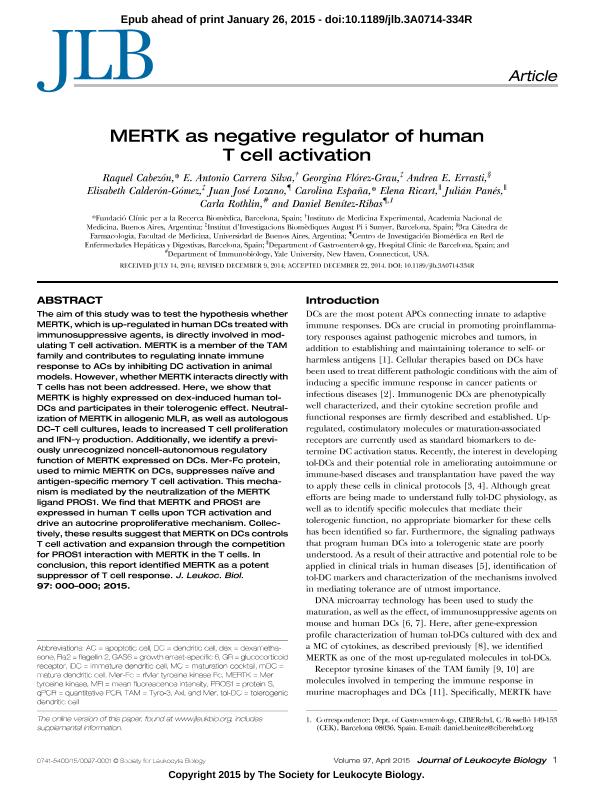Artículo
MERTK as negative regulator of human T cell activation
Cabezón, Raquel; Carrera Silva, Eugenio Antonio ; Flórez Grau, Georgina; Errasti, Andrea Emilse
; Flórez Grau, Georgina; Errasti, Andrea Emilse ; Calderón Gómez, Elisabeth; Lozano, Juan José; España, Carolina; Ricart, Elena; Panés, Julián; Rothlin, Carla; Benítez Ribas, Daniel
; Calderón Gómez, Elisabeth; Lozano, Juan José; España, Carolina; Ricart, Elena; Panés, Julián; Rothlin, Carla; Benítez Ribas, Daniel
 ; Flórez Grau, Georgina; Errasti, Andrea Emilse
; Flórez Grau, Georgina; Errasti, Andrea Emilse ; Calderón Gómez, Elisabeth; Lozano, Juan José; España, Carolina; Ricart, Elena; Panés, Julián; Rothlin, Carla; Benítez Ribas, Daniel
; Calderón Gómez, Elisabeth; Lozano, Juan José; España, Carolina; Ricart, Elena; Panés, Julián; Rothlin, Carla; Benítez Ribas, Daniel
Fecha de publicación:
04/2015
Editorial:
Federation of American Societies for Experimental Biology
Revista:
Journal of Leukocyte Biology
ISSN:
0741-5400
Idioma:
Inglés
Tipo de recurso:
Artículo publicado
Clasificación temática:
Resumen
The aim of this study was to test the hypothesis whether MERTK, which is up-regulated in human DCs treated with immunosuppressive agents, is directly involved in modulating T cell activation. MERTK is a member of the TAM family and contributes to regulating innate immune response to ACs by inhibiting DC activation in animal models. However, whetherMERTK interacts directly with T cells has not been addressed. Here, we show that MERTK is highly expressed on dex-induced human tol- DCs and participates in their tolerogenic effect. Neutralization of MERTK in allogenic MLR, as well as autologous DC–T cell cultures, leads to increased T cell proliferation and IFN-γ production. Additionally, we identify a previously unrecognized noncell-autonomous regulatory function of MERTK expressed on DCs. Mer-Fc protein, used to mimic MERTK on DCs, suppresses naïve and antigen-specific memory T cell activation. This mechanism is mediated by the neutralization of the MERTK ligand PROS1. We find that MERTK and PROS1 are expressed in human T cells upon TCR activation and drive an autocrine proproliferative mechanism. Collectively, these results suggest that MERTK on DCs controls T cell activation and expansion through the competition for PROS1 interaction withMERTK in the T cells. In conclusion, this report identified MERTK as a potent suppressor of T cell response.
Palabras clave:
SUPPRESSION
,
TAM RECEPTORS
,
TOLEROGENIC DENDRITIC CELLS
Archivos asociados
Licencia
Identificadores
Colecciones
Articulos(OCA HOUSSAY)
Articulos de OFICINA DE COORDINACION ADMINISTRATIVA HOUSSAY
Articulos de OFICINA DE COORDINACION ADMINISTRATIVA HOUSSAY
Citación
Cabezón, Raquel; Carrera Silva, Eugenio Antonio; Flórez Grau, Georgina; Errasti, Andrea Emilse; Calderón Gómez, Elisabeth; et al.; MERTK as negative regulator of human T cell activation; Federation of American Societies for Experimental Biology; Journal of Leukocyte Biology; 97; 4; 4-2015; 751-760
Compartir
Altmétricas



